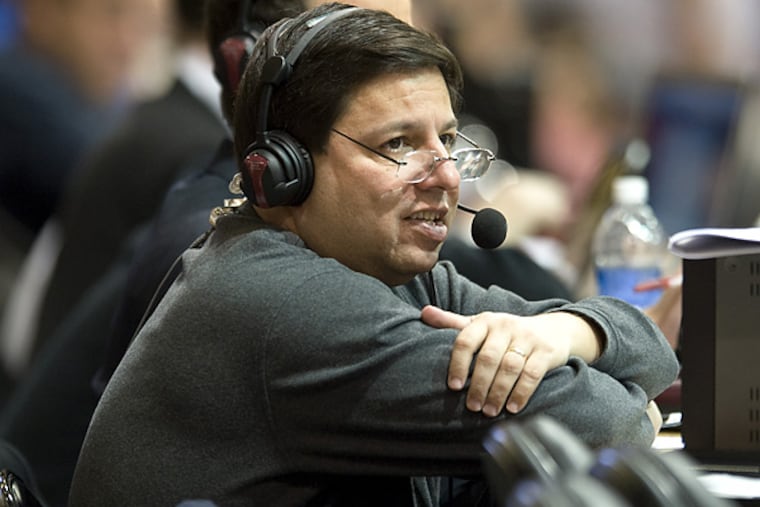If the NCAA can’t have 68 teams at its 2021 men’s basketball tournament, bracketologist Joe Lunardi has contingency brackets at the ready
In his 27th year of creating mock NCAA brackets, Lunardi has devised seedings and pairings for fields of 48, 80 and 16 teams in addition to the standard 68-team event.

This much is clear – the NCAA is planning to have a men’s basketball tournament on its regular schedule. But what’s not clear is, will the event have its full complement of 68 teams given the uncertainty of the pandemic?
So for those of you who wonder what a mock bracket of 68, 48, or 16 teams may look like, longtime ESPN bracketologist Joe Lunardi is here to help.
Lunardi, who is in his 27th year of crafting brackets, said he and his editor and design team at ESPN.com came up with contingency brackets of 48 and 16, and even 80 teams, along with the standard field of 68 to give an idea of what a modified March Madness would look like.
Given the rise in the number of postponed games because of coronavirus issues affecting teams, and the high number of cases throughout the country, nothing is definite.
“For example, suppose after Jan. 20, the new administration says, ‘We’re going to have a national or some kind of partial lockdown for three weeks or four weeks or six weeks,’” Lunardi said Wednesday. “Some leagues might say, ‘We’re done.’ The NCAA’s intent is absolutely 68, as well it should be, and they need to plan for that. But to be certain that that’s going to happen over two months out is just guessing really.”
Then there’s also the NCAA rule that a team must play a minimum of 13 games against Division I opponents to be considered for tournament selection. As of Wednesday, Duke had played just five games and Akron, the top-rated Mid-American Conference team in the NET rankings, had competed in four.
“I certainly don’t think that the 13-game piece is going to come into play unless there is a major national shutdown,” Lunardi said. “There are more teams closer to 13 than there are to two. So I don’t think that’s going to be an issue.
“If for some unforeseen reason a team can’t get to 13, (NCAA senior vice president of basketball) Dan Gavitt has already said that waivers would be considered. If Duke somehow has 12 games heading into the ACC Tournament, and then the ACC Tournament gets canceled, I think there’s a lot of pressure to have a waiver of some kind.”
Of course, a smaller 48-team tournament would cost the field some marquee names. In Lunardi’s latest such bracket, Duke and Michigan State would be on the bubble, and North Carolina and Indiana would be out.
Villanova, which is currently pausing team activities after two players tested positive Monday for the virus, is a No. 1 seed in all brackets, joining Gonzaga, Baylor, and Texas. The Wildcats have not played since a Dec. 23 win at Marquette, and their fourth and fifth consecutive postponements – Friday versus Marquette, Wednesday at Xavier – are coming up.
“Right now, any reasonable observer would make Villanova a 1 seed based upon their preseason rankings and who and how they won when they were playing,” Lunardi said. “Now if they would continue to have more interruptions, then you say to yourself, ‘All right, are they going to get passed by other high-level teams that are simply getting more quality wins?’ And the answer is yes. I don’t think that you can generally gain by not playing.”
Regarding the 80-team bracket, Lunardi said if he headed the committee, and it could be done safely, he’d be inclined to invite more teams to the tournament. The event would begin with 16 opening-round games to be played on the home court of the higher seed. Teams that finished as regular-season and tournament champions in their conference would receive opening-round byes.
“We have fewer ways to evaluate this year,” he said. “In order to capture the pool of good teams with a smaller sample size, a statistician would tell you, you need to increase the field, not decrease it. But look, any tournament is better than no tournament, so we’re just trying to be prepared for as many contingencies as could still happen.”
Because of limited non-conference play this season, you may see a team in the bracket with a losing record, Lunardi said, just another anomaly in an unusual year.
“Seeding is going to be screwy,” he said. “I know there’s going to be head-scratchers. Nobody is going 68 for 68 this year. If they do, it’s a complete fluke.”